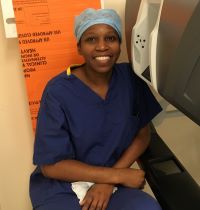Chimwemwe Miti
Key-hole Precision: Sensor Guided Laparoscopic Abdominal Entry
 |
Supervisors:
Email: c.miti@bristol.ac.uk Twitter: @docsymiti |
Project Summary:
The project is borne of the need to improve surgical safety and seeks to investigate whether the manually performed laparoscopic abdominal entry techniques currently in use, can be enhanced through a sensor enabled intelligent electronic device. Although minimally invasive surgery has improved post-operative outcomes, primary entry during abdomino-pelvic laparoscopic procedures, which largely proceeds ‘blindly’, has remained inadequately addressed. Moreover, because laparoscopic surgery in specialties like benign gynaecologic surgery is superior to laparotomy, improving entry techniques- from where most of the complications arise- is likely to result in safer surgery, alongside the provision of surgeons with an adequate entry aide. Truly multidisciplinary, this project will draw on various expertise and so bring together the best and brightest in resolving this surgical dilemma.
General Profile:
My background lies in gynaecology and being a keen minimal access surgeon, my research ambitions surround sensor technology as applied to minimally invasive surgery.
Prior to joining the Digital Health & Care CDT, I successfully completed a Master of Surgery Degree with Distinction at University College London. This course was crucial in defining my future interests as it brought together both practical and theoretical components of Minimally Invasive Surgery & Robotics and has definitely shaped my project direction.
It is therefore of no surprise that I aspire to lead the transformation of the surgical landscape into one that effectively utilises digital methods of delivering surgical treatment as well as in teaching and mentoring.